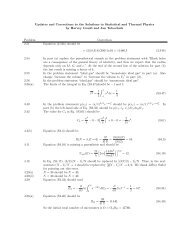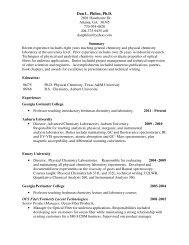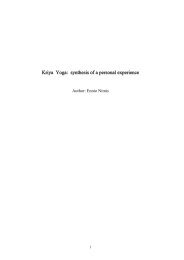Manifesto of the Communist Party - WebRing
Manifesto of the Communist Party - WebRing
Manifesto of the Communist Party - WebRing
Create successful ePaper yourself
Turn your PDF publications into a flip-book with our unique Google optimized e-Paper software.
The Socialistic bourgeois want all <strong>the</strong> advantages <strong>of</strong> modern social conditions without <strong>the</strong><br />
struggles and dangers necessarily resulting <strong>the</strong>refrom. They desire <strong>the</strong> existing state <strong>of</strong> society<br />
minus its revolutionary and disintegrating elements. They wish for a bourgeoisie without a<br />
proletariat. The bourgeoisie naturally conceives <strong>the</strong> world in which it is supreme to be <strong>the</strong> best;<br />
and bourgeois Socialism develops this comfortable conception into various more or less complete<br />
systems. In requiring <strong>the</strong> proletariat to carry out such a system, and <strong>the</strong>reby to march straightway<br />
into <strong>the</strong> social New Jerusalem, it but requires in reality, that <strong>the</strong> proletariat should remain<br />
* The revolutionary storm <strong>of</strong> 1848 swept away this whole shabby tendency and cured its protagonists <strong>of</strong> <strong>the</strong><br />
desire to dabble fur<strong>the</strong>r in Socialism. The chief representative and classical type <strong>of</strong> this tendency is Herr Karl Grün.<br />
[Note by Engels to <strong>the</strong> German edition <strong>of</strong> 1890.]<br />
within <strong>the</strong> bounds <strong>of</strong> existing society, but should cast away all its hateful ideas concerning <strong>the</strong><br />
bourgeoisie.<br />
page 69<br />
A second and more practical, but less systematic, form <strong>of</strong> this Socialism sought to depreciate<br />
every revolutionary movement in <strong>the</strong> eyes <strong>of</strong> <strong>the</strong> working class, by showing that no mere political<br />
reform, but only a change in <strong>the</strong> material conditions <strong>of</strong> existence, in economical relations, could be<br />
<strong>of</strong> any advantage to <strong>the</strong>m. By changes in <strong>the</strong> material conditions <strong>of</strong> existence, this form <strong>of</strong><br />
Socialism, however, by no means understands abolition <strong>of</strong> <strong>the</strong> bourgeois relations <strong>of</strong> production,<br />
an abolition that can be effected only by a revolution, but administrative reforms, based on <strong>the</strong><br />
continued existence <strong>of</strong> <strong>the</strong>se relations; reforms, <strong>the</strong>refore, that in no respect affect <strong>the</strong> relations<br />
between capital and labour, but, at <strong>the</strong> best, lessen <strong>the</strong> cost, and simplify <strong>the</strong> administrative work,<br />
<strong>of</strong> bourgeois government.<br />
Bourgeois Socialism attains adequate expression, when, and only when, it becomes a mere<br />
figure <strong>of</strong> speech.<br />
Free trade: for <strong>the</strong> benefit <strong>of</strong> <strong>the</strong> working class. Protective duties: for <strong>the</strong> benefit <strong>of</strong> <strong>the</strong> working<br />
class. Prison Reform: for <strong>the</strong> benefit <strong>of</strong> <strong>the</strong> working class. This is <strong>the</strong> last word and <strong>the</strong> only<br />
seriously meant word <strong>of</strong> bourgeois Socialism.<br />
It is summed up in <strong>the</strong> phrase: <strong>the</strong> bourgeois is a bourgeois -- for <strong>the</strong> benefit <strong>of</strong> <strong>the</strong> working<br />
class.<br />
3. CRITICAL-UTOPIAN SOCIALISM<br />
AND COMMUNISM<br />
We do not here refer to that literature which, in every great modern revolution, has always given<br />
voice to <strong>the</strong> de-<br />
page 70<br />
mands <strong>of</strong> <strong>the</strong> proletariat, such as <strong>the</strong> writings <strong>of</strong> Babeuf and o<strong>the</strong>rs.<br />
The first direct attempts <strong>of</strong> <strong>the</strong> proletariat to attain its own ends, made in times <strong>of</strong> universal<br />
excitement, when feudal society was being overthrown, <strong>the</strong>se attempts necessarily failed, owing to

















